Farmers markets are ESSENTIAL. Let’s celebrate them the first week of August
 Print This Post
Print This Post
By Maura Henn, NCAT Community Food Systems Specialist; Tammy Howard, NCAT Agriculture Specialist; and Dave Scott, NCAT Livestock Specialist
Like many beginning farmers, I started out selling at farmers markets in central New York State. It afforded me the opportunity to try out my marketing skills with relatively little risk. I also enjoyed the real-time interaction with my customers, many of whom have become lifelong friends. I was farming in the late 1990s and early 2000s, and the farmers market scene has evolved and changed quite a bit since then. For one thing, the competition is greater as farmers become more savvy in marketing. There is also a lot of confusion about what a farmers market is, as larger retailers try to appeal to consumer’s desire to have a connection with farmers and local food. That is why taking time to celebrate the value of our community farmers markets once a year is more important than ever. —Tammy Howard
Since 1999, the first full week of August marks the beginning of National Farmers Market Week (NFMW). NFMW is an annual celebration of farmers markets coordinated by the Farmers Market Coalition (FMC), a membership-based 503(c)3 nonprofit organization that supports farmers markets nationwide through training, technical assistance, and network-building. This year, NFMW is August 2 through August 8, and 2020 marks 21 years of celebrating, supporting, and promoting farmers markets.
Why August? In the Unites States, August is the “peak season” for many types of products sold at farmers markets, and in most parts of the country, it is the time in the growing season when the most variety is available. This year, the NFMW celebration is centered on the essential role that farmers markets play in the food system as demonstrated by the coronavirus pandemic.
Farmers markets have been a healthy-food access point during a challenging time.
Farmers markets around the country were some of the first businesses to quickly pivot their operations to create safe shopping environments for their communities, implementing innovative strategies to change their operations around public health protocols.
What was first a mad scramble when the pandemic hit developed into wave of grassroots cooperation among farmers markets across the country. This cooperation resulted in the development of best practices and shared resources that helped many farmers markets continue supplying local, healthy, and affordable access to fresh food.
Many farmers markets had to work with local and state governments to ensure their market received the essential business distinction during lockdowns and phased state re-openings. The COVID-19 pandemic made it clear that local food systems with short supply chains are resilient and dependable in making food available to their communities. With support of the Farmers Market Coalition and farmers market advocates, markets across the country were able to remain open during this unprecedented time.
Farmers markets are one of the safest places to shop during the pandemic, especially when customers, vendors, and market managers work together to promote social distancing and mask wearing. Emerging research supports conventional wisdom that outdoor marketplaces like farmers markets are often safer than alternative indoor retailers due to fresh air circulation and sunlight. Market operators have implemented innovative strategies and shown flexibility to enforce social distancing by spreading out vendors and products.
Farmers Markets Help Incubate New Businesses
Markets can be ideal “low risk” opportunities for vendors to start selling their products. Dave’s Killer Bread and Hodo Tofu, both nationally renowned food businesses, started at farmers markets. Some farmers markets throughout the country have actively encouraged incubation through setting aside a few booths for new businesses every year. Check out your local farmers market to see if this is something they do.
Dave and Jenny Scott, of Montana Highland Lamb, started selling at farmers markets throughout Southwest Montana. Dave says that the farmers markets help ag entrepreneurship in the following ways:
• Providing feedback on the quality of the product you are offering and your pricing.
• Connecting to a larger agriculture community and statewide organizations that will help with production and navigating regulations.
• Meeting other buyers such as chefs and store owners.
• Developing your marketing expertise and help you hone in on which demographic you wish to focus on.
• Developing your marketing abilities.
“Farmers markets first and foremost helped us define and find our target customer and then determine if that customer thoroughly enjoyed our lamb product. We learned that our target customer and their satisfaction is the foundation of any marketing program.” —Dave Scott, Montana Highland Lamb
This does not mean that producers should expect immediate success. Farmers markets are like any other marketing channel, and success starts with a well-thought-out plan that identifies who your customer is and evaluates your competition. If you are interested in getting started in selling to farmers markets, check out ATTRA’s Tips for Selling at Farmers Markets, which will help you decide if selling through farmers markets is for you. It outlines pros and cons and tips for success.
Last year for National Farmers Market Week, we featured Ben Feldman, Executive Director of the Farmers Market Coalition, in the podcast Celebrating Farmers Markets.
“Farmers markets are essential to the life and livelihood of millions of shoppers and tens of thousands of farmers,” Feldman said. “But farmers markets don’’t happen by accident. It takes planning, organization, and execution of dedicated individuals and community organizations. That work is harder than ever and farmers markets and the vendors who sell at them need all the help they can get.”
For market managers and vendors, the Farmers Market Coalition has free tools to help you promote your market during NFMW. In addition, ATTRA has many useful resources in the Farmers Market section of our website.
Farmers markets have been able to adapt and maintain a crucial market channel for producers throughout the COVID-19 pandemic. Whether you are a consumer, vendor, or market manager, spend some time celebrating and promoting your local farmers market and their vendors during the week of August 2-8!
For more information on this topic, contact the authors directly at:
Tammy Howard: tammyh@ncat.org
Maura Henn: maurah@ncat.org
This publication is produced by the National Center for Appropriate Technology through the ATTRA Sustainable Agriculture program, under a cooperative agreement with USDA Rural Development. ATTRA.NCAT.ORG.

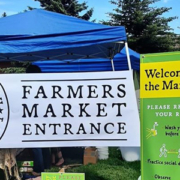
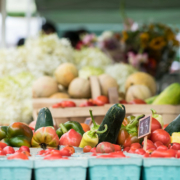
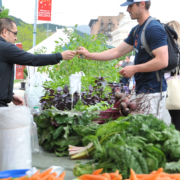
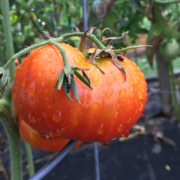
 ncat
ncat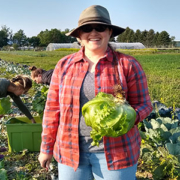
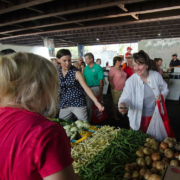 USDA Photo by Lance Cheung.
USDA Photo by Lance Cheung. 
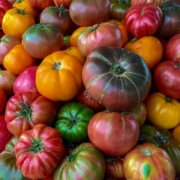 USDA photo by Lance Cheung
USDA photo by Lance Cheung USDA photo by Christophe Paul
USDA photo by Christophe Paul
